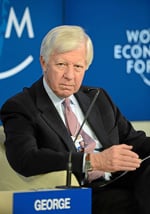 |
| Pfizer CEO Ian Read |
Pfizer has read the room in the U.K., and it's changing its pitch accordingly. With U.K. lawmakers skeptical of the company's commitment to keep AstraZeneca jobs and AstraZeneca science in the U.K., Pfizer over the weekend released a series of videos focusing on that science--and downplaying the tax benefits CEO Ian Read crowed about so loudly when first confirming his company's trans-Atlantic bid.
So, the pipeline AstraZeneca ($AZN) valued so highly in its own defense last week is also Pfizer's ($PFE) most important weapon in its fight to win approval for the buyout.
It's clear that Read and his CFO sidekick Frank D'Amelio will lean heavily on science when they appear before a parliamentary committee Tuesday. Also clear: They will shy away from too much emphasis on the deal's tax benefits. Ditto the "synergies" that serve as the third leg of Pfizer's buyout case, now that U.K. and U.S. officials are riled up about big job cuts in both countries. In fact, in one video, Read tried to make cost-cutting sound like a public service.
Also among the unmentionables: Pfizer's history of buying up big rivals and cutting back on jobs, R&D spending, and the other "overlapping functions" Read referred to--glancingly--during one of the videos released over the weekend. But with every media outlet looking for a fresh angle on the enormous deal, plenty of talking heads, editorial writers, news reporters, and industry insiders are analyzing those very aspects of the deal, which would be the biggest foreign buyout in U.K. history.
Consider these warring quotes from Read. Last week, Bloomberg notes, the Pfizer CEO said his bid for AstraZeneca is "not a pipeline story per se." While the two R&D portfolios do fit, the other two key aspects of the deal--cost-cutting and tax savings--are important, he said (as quoted by the news service). "I've been asked, would you do it if you didn't have this part or you didn't have that part?" Read said during a call with analysts. "I'm doing it because I have all three parts."
Fast-forward to Saturday's video statement: "When we looked at AZ, we liked their science. We liked where their science is being done." And then, "It really meets the scientific needs."
Sure, the tax savings and other cost cuts help justify the deal--but they'll also help fund R&D spending, Read said. And besides, consolidating two companies and shaving off the overlap will help answer governments' demands for lower-cost drugs.
Sorting through these comments isn't just an intellectual exercise. Pfizer's true motivations would soon be apparent if a deal were consummated, analysts say. Painfully so, under the tax-and-cost-cuts case. "If they buy Astra because of the R&D, they will have to ring-fence the R&D completely," Rahn & Bodmer fund manager Birgit Kulhoff told Bloomberg. "However, if they buy it because of taxes, then I think they will make big cuts."
Meanwhile, more than a few politicians and pharma-watchers have pointed out that Pfizer says its promises to keep U.K. jobs and R&D facilities are the legally binding, ironclad vows that government ministers want. They also point out that the company reserves the right to change, if circumstances change significantly.
 |
| Bill George |
Industry perspective? Former Medtronic ($MDT) CEO Bill George points out Pfizer's financial record vis-à-vis megamergers. The company bought Warner-Lambert, Pharmacia and Wyeth for $240 billion total. After each deal, it cut jobs and R&D spending. Since mid-2000, Pfizer's stock price has dropped to $32 per share from $46, George points out. And this during a period when the Dow rose by 43%. The Financial Times, meanwhile, cites that $240 billion in buyouts against Pfizer's current market cap of $185 billion.
George has also consulted with AstraZeneca, which could make him biased in favor of the U.K. company, or privy to insider info that informs his opinion, or both. And his take on that side of the story is that CEO Pascal Soriot has made some big and promising moves, from R&D to M&A. A Pfizer buyout would water down those changes, George figures, with a "mass exodus" of AZ execs and scientists, and lost momentum in R&D. Bottom line, per George? It's a choice between "alluring short-term cost and tax savings" and "long-term gains from drug discovery." Any guess which side he prefers?
Many U.K. government ministers--plus a majority of U.K. voters, according to a Daily Mail survey--say they're opposed to the deal. Those in favor want guarantees--enforceable guarantees. But legally, there's not much the U.K. government can do. Built-in safeguards against unwanted foreign buyouts--like those in France or Germany--are mostly absent in the U.K. The European Commission can review the deal, but that's about preserving competition, not preserving jobs. The case for a so-called public interest test--which some in the U.K. are touting--is rather tenuous.
Ironically, it's the U.S. government that could actually throw a spanner in Pfizer's plans. A couple of Democratic congressmen say they're working on a bill that would bar the sort of "tax inversion" moves on which Pfizer's deal calculus depends. President Obama's budget also includes a tax-inversion limit. If lawmakers could win enough support to pass such a bill, Pfizer's numbers wouldn't add up quite so well. We'd put the odds of that at virtually nil. But if U.K. opponents really want to stop Pfizer's bid, they should start lobbying in the U.S., too.
- see Pfizer's latest release
- check out the New York Times piece (sub. req.)
- get more from the FT
- read the Daily Mail story
Special Reports: The top 10 pharma companies by 2013 revenue - Pfizer - AstraZeneca